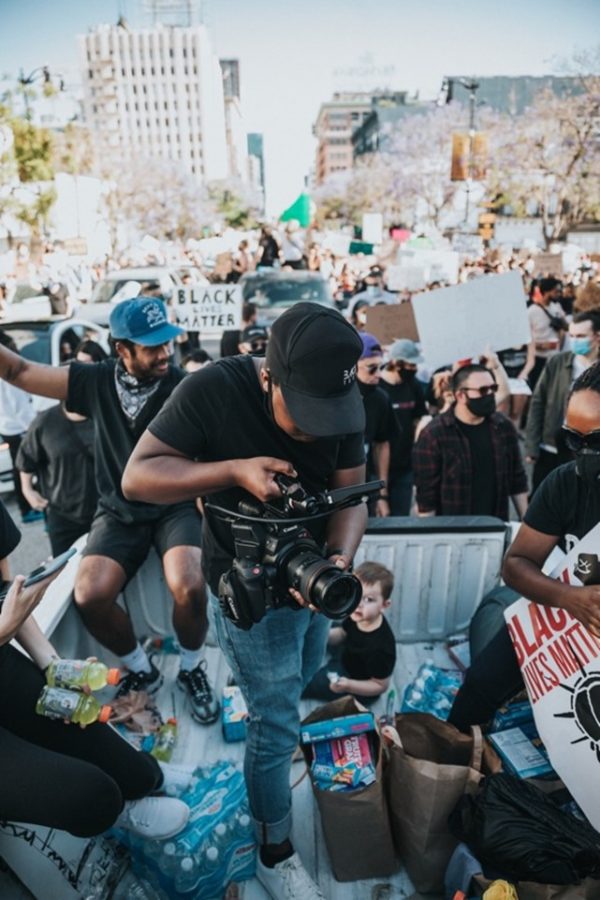
In June 2020, at the height of the Black Lives Matter (BLM) revival after the murder of George Floyd, journalists with Report for America were told by their director Alison Bethel McKenzie that they could not wear a BLM T-shirt while out on assignment nor donate to social media fundraisers for the movement (Thompson, 2020). Nearly a year later in May 2021, Emily Wilder was fired from her position as a rookie news associate with the Associated Press after only 3-weeks when pro-Palestinian posts from her college days surfaced on Twitter (Nashrulla, 2021). These incidents and many more like them illustrate an increasingly prevalent and controversial issue in the field of journalism: activism. As various social movements have gained significant traction over the last decade, more and more citizens have added their voices to combat injustice – but what if some of those citizens speaking out are supposed to be impartial reporters by profession? Can (or should) journalists also be activists?
The traditional answer to this question is simple: no. For example, organizations like The Radio, Television, and Digital News Foundation believe that “political activity and active advocacy can undercut the real or perceived independence of those who practice journalism” (“Code of Ethics,” RTDNF). Indeed, readers may be reluctant to read an article from an outspoken journalist for fear of distortion of facts; the worry is that their taking of sides might compromise the reporting of unvarnished truth. Such a state of affairs is dangerous because it can lead to a less informed populace if consumers distrust the integrity of journalists or the credibility of their publications. Given the fact that we are living “in an era of fake news, click-bait journalism,” and the spread of misinformation, freelance journalists Deepak Adhikari has argued that “the need for [balanced, objective, and evidence-based] professional journalism has never been more urgent” (Adhikari, 2017). Importantly, the question of journalist participation in activism goes beyond the reputation of any individual reporter because “participation will impact their colleagues” and may reflect poorly on the entire institution (McBride, 2021). This implication has led outlets like The Washington Post to implement strict Ethics Codes which instruct their journalists to “avoid active involvement in any partisan causes —politics, community affairs, social action, demonstrations— that could compromise or seem to compromise our ability to report and edit fairly” (“Policies and Standards”).
Conversely, others have recently shifted toward the idea that it may not only be allowable, but perhaps even advisable, for reporters to engage in activism. Laura Wagner, a journalist with Defector, has argued that journalism needs to abandon the “unreasonable and hideously stupid expectation that reporters must harbor no strong opinions about the things they care about” (Kafka, 2021). Regardless of their profession, journalists are still citizens with a right to express their views, and institutions that require strict impartiality (including outside of the newsrooms on personal social media accounts) are infringing on individual freedom of speech. By disallowing them from standing up for what they believe in, journalists are put in an unfair position to choose between what they view as right and keeping their jobs. If anything, an argument could be made that journalists being outspoken about their political beliefs only enhances their transparency, rather than pretending to be a blank slate with a press pass. Moreover, concerning the bigger picture of social movements overall, organizations like BuzzFeed News have argued that attempting to prioritize objectivity over justice only leads to privileging oppressive views. They state: “We firmly believe that for a number of issues, including civil rights, women’s rights, anti-racism, and LGBT equality, there are not two sides” (Hilton, 2015). Some, like University of Oregon journalist Kiva Hanson, even contend that “Journalism has been activism since its inception” (Hanson). Invoking examples like famous journalist Ida B. Wells, co-founder of the NAACP who meticulously documented violence against African Americans, Hanson argues that it is “journalists [who have] continually exposed massive injustices within schools, governments and businesses” (Hanson).
Another view has emerged trying to balance both the ability of reporters to engage in activism with the practical concerns of practicing professional journalism. For example, Axios announced that their writers were allowed to participate in BLM protests under the protection of free speech, but the co-founder Jim VandeHei also indicated “he did not intend his note to actively encourage marching in protests… [and] reminded the staff that the company’s reporters still need sources to open up to them, and that appearing to take one side could jeopardize their position” (Lee and Smith, 2020). Furthermore, though Report for America’s McKenzie has personally experienced racism “both on and off the job,” she “urges conflicted journalists to consider” that there are already plenty of citizens on social media advocating for just causes but not enough journalists of color covering them (Thompson, 2020). In this sense, she reasons that it is more important for people like herself to hold onto their institutional positions rather than risk their jobs or their credibility with the public (Thompson, 2020). While these arguments do not attempt to paint journalist activism as inappropriate, they do point to the need to consider pragmatism as well as ethics.
In the end, journalists will only continue to face many ethical dilemmas regarding their profession and their desire to support social justice movements. Going forward, both individual reporters and media outlets will need to continually review (and potentially re-evaluate) their personal, professional, and institutional Code of Ethics. While some journalists may decide to move to independent reporting for more freedom, some organizations may decide to set new precedents for journalism in the modern age. Ultimately, only time will tell.
Discussion Questions:
- What ethical values conflict when journalists engage in activism? What values conflict when they don’t?
- Do you prefer a journalistic code of ethics that prohibits activism, allows it, or endorses some other position? Explain your reasoning.
- What guidelines would you suggest for balancing all of the conflicting ethical and pragmatic concerns involved with journalist activism?
- Where do you think the line between being a journalist ends and a citizen begins? What, if anything, separates a journalist from an activist?
- Write a code of ethics for journalists who also want to take part in public activism that may relate to the stories they cover. What values should guide them? What actions are encouraged or discouraged?
Further Information:
Adhikari, Deepak. (2017, April 10). “The Case Against: Can Journalists be Activists?” Al Jazeera. Available at: https://www.aljazeera.com/opinions/2017/4/10/the-case-against-can-journalists-be-activists
Blanding, Michael. (2018, August 21). “Where Does Journalism End and Activism Begin?” Nieman Reports. Available at: https://niemanreports.org/articles/where-does-journalism-end-and-activism-begin/
“Code of Ethics.” (2015, June 11). Radio Television Digital News Foundation. Available at: https://www.rtdna.org/content/rtdna_code_of_ethics
Hanson, Kiva. (n.d.). “How Being an Activist Makes me a Better Journalist.” University of Oregon, School of Journalism and Communication. Available at: https://journalism.uoregon.edu/how-being-activist-makes-me-better-journalist
Hilton, Shani. (2015, January 30). “The BuzzFeed News Standards and Ethics Guide.” Buzzfeed News. Available at: https://www.buzzfeednews.com/article/shani/the-buzzfeed-editorial-standards-and-ethics-guide#.iq46LYaEGP
Jones, Tom. (2021, July 30). “Should Journalists be Allowed to Protest? A Legendary News Organization Tries to Address that Issue.” Poynter. Available at: https://www.poynter.org/commentary/2021/should-journalists-be-allowed-to-protest-a-legendary-news-organization-tries-to-address-that-issue/
Kafka, Peter. (2021, May 26). “Journalists Can Tweet About Black Lives Matter but not About Palestine.” Vox. Available at: https://www.vox.com/recode/22448032/emily-wilder-ap-israel-palestine-tweets-firing-journalism-objectivity
Lee, Edmund and Ben Smith. (2020, June 8). “Axios Allows Its Reporters to Join Protests.” New York Times. Available at: https://www.nytimes.com/2020/06/08/business/media/axios-allows-reporters-protest-march.html
McBride, Kelly. (2021, July 29). “New NPR Ethics Policy: It’s OK For Journalists to Demonstrate (Sometimes).” NPR. Available at: https://www.npr.org/sections/publiceditor/2021/07/29/1021802098/new-npr-ethics-policy-its-ok-for-journalists-to-demonstrate-sometimes
Miller, Karla. (2021, January 21). “When Free Speech Clashes with Keeping your Job.” The Washington Post. Available at: https://www.washingtonpost.com/business/2021/01/21/when-free-speech-clashes-with-keeping-your-job/
Nashrulla, Tasneem. (2021, May 22). “In College, She Was a Pro-Palestinian Activist. The AP Just Fired Her After a Conservative ‘Witch Hunt.’” BuzzFeed News. Available at: https://www.buzzfeednews.com/article/tasneemnashrulla/ap-fire-reporter-palestinian-emily-wilder
“NPR Ethics Handbook.” NPR. Available at: https://www.npr.org/ethics
“Policies and Standards.” Washington Post. Available at: https://www.washingtonpost.com/policies-and-standards/
Thompson, Linda. (2020, June 19). “Should a Journalist be able to Attend a #BlackLivesMatter Protest as a Civilian?” Media Diversity Institute. Available at: https://www.media-diversity.org/should-a-journalist-be-able-to-attend-a-blacklivesmatter-protest-as-a-civilian/
Authors:
Kerry O’Malley Gleim, Kat Williams, & Scott R. Stroud, Ph.D.
Media Ethics Initiative
Center for Media Engagement
University of Texas at Austin
October 31, 2022
Image by Nathan Dumlao on Unsplash
This case study is supported by funding from the John S. and James L. Knight Foundation. It can be used in unmodified PDF form for classroom or educational settings. For use in publications such as textbooks, readers, and other works, please contact the Center for Media Engagement.
Ethics Case Study © 2022 by Center for Media Engagement is licensed under CC BY-NC-SA 4.0




